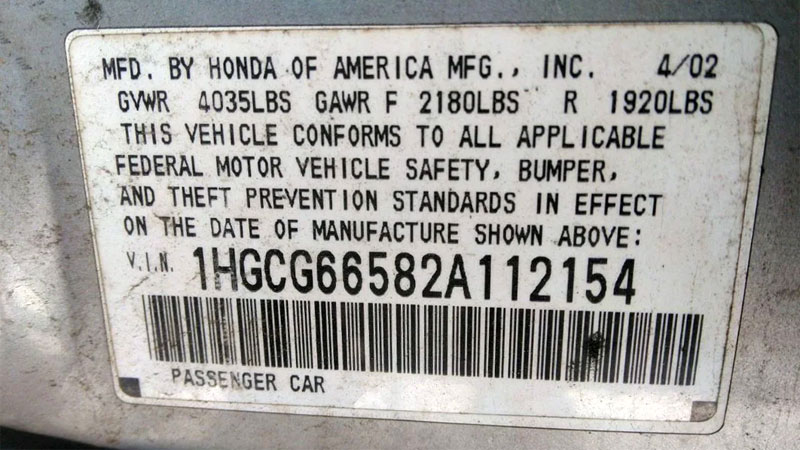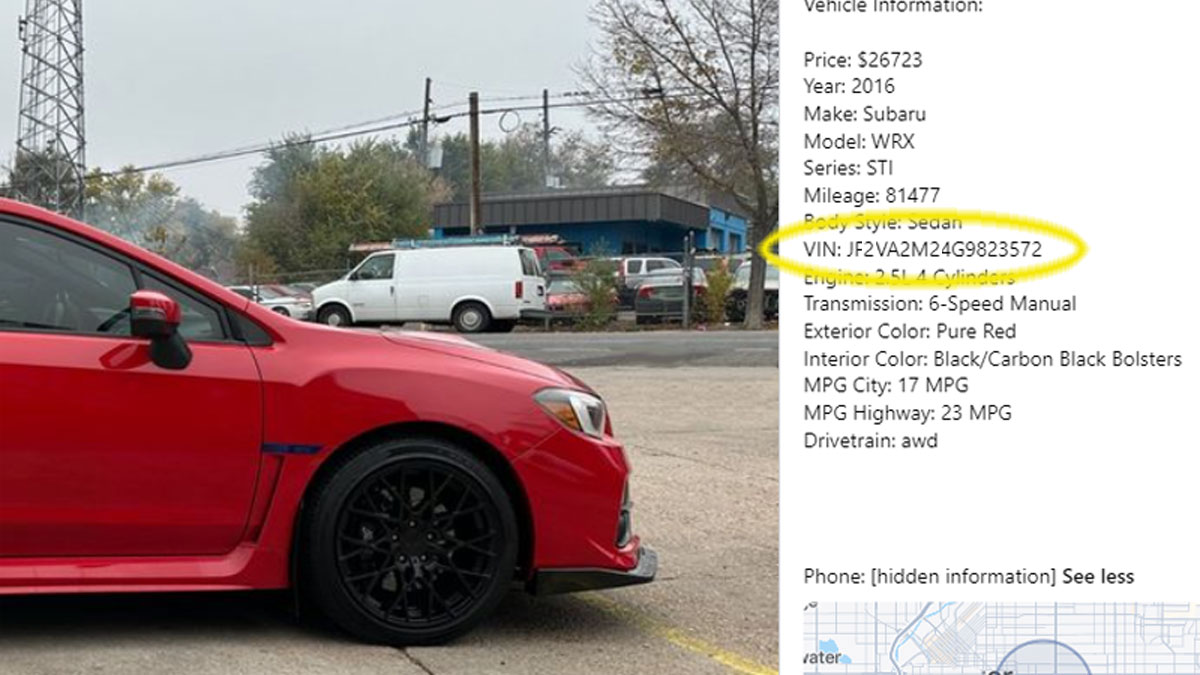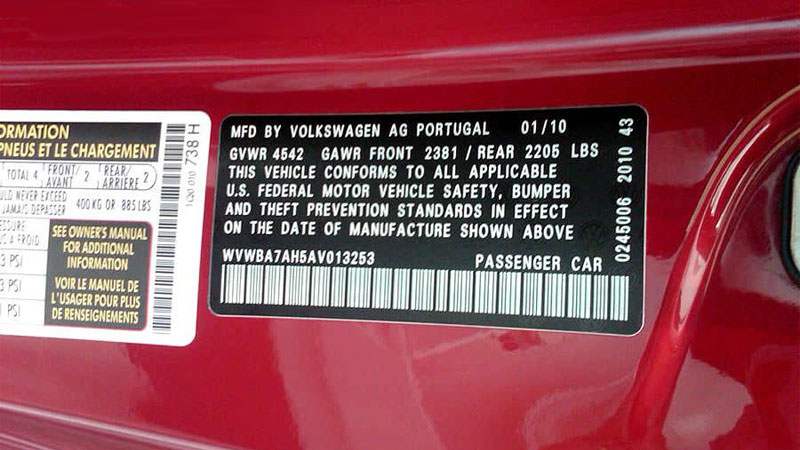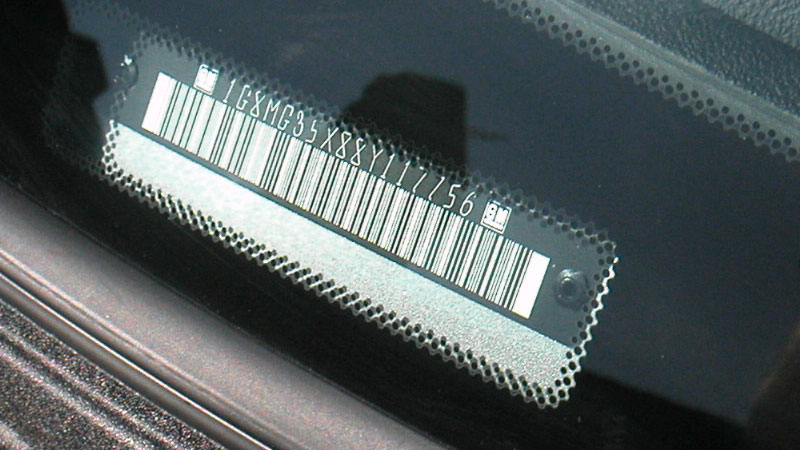Here’s the truth about giving out your VIN.
When selling your car or using various online services, giving out your VIN raises valid privacy concerns. Some may argue that sharing your VIN could potentially open doors to identity theft or fraud. On the other hand, providing a VIN number to potential buyers is necessary for transparency.
So what should you do? In this article, we’ll uncover the truth about VIN safety in the digital age.
Purpose of a VIN
A Vehicle Identification Number (VIN) is a unique 17-character code assigned to every car when it’s manufactured. The VIN serves as your car’s fingerprint, providing essential information about the vehicle. It helps you identify important aspects, such as the make, model, and year of your vehicle.
Each VIN includes specific details about the vehicle’s technical attributes. This can range from the engine size, transmission type, body style, and other important features. The VIN also allows you to access your vehicle’s history, which can be helpful when purchasing a used car or selling your current one.
You can find your vehicle’s VIN in various locations, such as the front corner of the dashboard, the driver’s side door jamb, or under the hood near the windshield. If you’re ever in doubt regarding your car’s VIN location, please refer to: Where is my VIN Number Located?

Potential Risks of Sharing Your VIN
While it may seem harmless to share your VIN publicly, there are some risks to be aware of.
Oversharing Personal Information
Sharing your VIN provides more information about you and your vehicle than you may realize. With your VIN, someone could look up your make, model, year, and other details that can be used to identify you. It’s generally wise to avoid oversharing personal information online whenever possible.
Vehicle Theft
Having your VIN exposes you to potential vehicle theft. While your VIN alone does not provide access to your vehicle, it gives thieves key information about your car that aids in locating, identifying, and stealing it. Though unlikely the VIN would be used in this way, the possibility exists.
Identity Theft
Your VIN is connected to your name and address on your vehicle registration and insurance documents. In the wrong hands, it could be used as a stepping stone in identity theft schemes to take out loans or credit cards in your name.
Fraud
In some instances, scammers run vehicle history reports using your VIN and then contact you about “issues” to gain your trust and, ultimately, your money. Be skeptical when receiving unsolicited advice related to your car’s history.
Scammers may also use your VIN to list your vehicle for sale without your consent or even attempt to apply for a replacement VIN and title.
Targeted Ads/Mail
Crafty marketers can use your VIN to send targeted emails or mailers to your address. While this may not be as dangerous as other risks, it can become an inconvenience.
Harassment
In some cases, vindictive individuals may look up the address associated with a VIN, putting your privacy at risk. Be mindful of sharing your VIN with strangers to avoid potential harassment.
Counterpoints – Why Sharing a VIN May Be Safe
While sharing your vehicle identification number does carry some risks, there are also many instances where it can be safe to disclose it.
First, it’s important to remember that VINs are already searchable through many public databases. Your VIN isn’t as private as you may think, so sharing it does not necessarily increase your risk.
In addition, most criminal activities involving vehicles require the thief to have physical possession of the car itself. Merely having access to the VIN rarely enables harm on its own. This perspective shows that sharing your VIN is not an automatic invitation for criminals to target you.
There are also many reputable businesses like insurance providers, mechanics, dealerships, and vehicle history report services that require your VIN for legitimate purposes. Providing your VIN to established professionals you trust is not only safe but also often necessary to get accurate services.
The key is being thoughtful about who you share your VIN with and verifying you are dealing with valid companies, not scams. With some wisdom, disclosing your VIN can be safe in most circumstances.
Importance of VIN for Car Buyers
If you’re a potential car buyer, obtaining the vehicle identification number should be a top priority. The VIN acts as the car’s unique fingerprint and provides you with valuable information to make a wise purchasing decision.
With the VIN, you can order a vehicle history report that lists previous accidents, ownership records, mileage, recalls, and other important details. Having access to this report promotes transparency in the transaction and allows you to enter negotiations with the seller as an informed buyer.
Without the VIN, you wouldn’t know if the vehicle had a clean, salvage, rebuilt, or blue title. Checking the VIN also shows the seller you are serious about properly vetting the car before purchasing. Be sure to request the VIN from the seller early on and use it to your full advantage during the car buying process.
Providing the VIN to Potential Buyers
If you’re selling your car, it’s completely normal to share the vehicle identification number with serious potential buyers (and is expected).
Providing the VIN helps build trust and transparency during the sales process. It allows buyers to access a detailed vehicle history report, which can give them confidence to purchase your car. Importantly, the VIN does not reveal any personal details about you as the seller – it simply provides information about the vehicle itself.
Just use some caution and avoid openly posting the full VIN in public advertisements. It’s best to only share it privately with individuals who have demonstrated a genuine intent to purchase your vehicle.
Tips For Sharing VIN Safely
- Only provide your full VIN to trusted individuals and businesses that need it for legitimate purposes, like your insurance company, mechanic, or a serious buyer.
- When posting a sales ad, only include a partial VIN or no VIN at all. Wait to disclose the full number until you’ve vetted interested buyers.
- Be wary of unsolicited requests for your VIN, as these could be scams. Verify the identity and intent of anyone asking for your VIN before providing it.
- Don’t include your full VIN in public forums or on social media, as this creates unnecessary risk of fraud.
- Trust your instincts. If something feels off about a VIN request, don’t ignore your gut feeling.
Dealing With Authorities and VIN
As a car owner, having your VIN readily available is necessary when dealing with entities like law enforcement, your insurance company, and vehicle manufacturers.
During registration, the authorities need your VIN to properly identify and validate your vehicle information. For insurance, providers require your VIN to accurately assess coverage factors based on your exact car’s details. And for recalls or other safety issues, manufacturers rely on VINs to notify owners and address problems.
So whether you’re registering your new car, opening an insurance policy, or ensuring you’re aware of the latest recall notices, make sure to have your VIN handy to share. Authorities, insurers, and manufacturers all use it for legitimate purposes to maintain your vehicle’s proper records and security.
Providing your VIN to trusted institutions like these is completely safe and part of being a responsible car owner.
Is a Vehicle’s VIN Considered “Confidential” Information?
A vehicle’s VIN is not confidential information. In fact, it’s easily visible on your car, typically on the driver’s side dashboard or the door frame on the driver’s side.
It’s the same reason why a license plate isn’t considered confidential information either. When your vehicle is out on the roads or parked in public places, both of these pieces of information may be visible.
- History of the Chevrolet SSR: The Retro-Styled Convertible Pickup - Apr 25, 2024
- The History of the BMW M Coupe (the “Clown Shoe”) - Mar 26, 2024
- The History of the Ford Flex - Feb 28, 2024



